Bringing a new puppy home is an exciting and joyous experience, filled with playful moments and endless cuddles. As a responsible pet parent, ensuring your puppy’s health and safety is paramount, especially when it comes to their diet. Puppies are particularly vulnerable to certain foods that adult dogs might tolerate in small amounts due to their developing digestive systems, smaller body weight, and higher sensitivity. Understanding What Foods Not To Give Puppies is not just important; it’s critical to prevent serious health issues, emergencies, and even fatalities.
While the world of puppy nutrition can seem daunting, this guide will serve as your essential resource, highlighting common household foods that pose a significant threat to your furry friend. We’ll delve into why these foods are dangerous, what symptoms to watch for, and crucial steps to take if your puppy accidentally ingests something toxic. By being informed and vigilant, you can help your beloved puppy grow into a healthy, happy adult dog.
Why Puppies Are More Vulnerable to Toxic Foods
Puppies are not just miniature versions of adult dogs; their bodies are still undergoing rapid development, making them uniquely susceptible to certain dietary hazards. Several factors contribute to their increased vulnerability:
- Smaller Body Weight: Even a small amount of a toxic substance can have a much more profound and dangerous effect on a puppy compared to a larger adult dog. The concentration of toxins per pound of body weight is significantly higher.
- Developing Digestive Systems: A puppy’s digestive tract is still maturing and is less efficient at processing certain compounds. This can lead to quicker absorption of toxins or more severe gastrointestinal upset.
- Immature Immune Systems: Their immune systems are not fully developed, potentially making them less resilient to illnesses caused by foodborne pathogens or toxic reactions.
- Curiosity and Indiscriminate Eating: Puppies are naturally curious and often explore their world by tasting everything. This indiscriminate eating behavior increases their risk of ingesting harmful substances.
- Higher Metabolic Rate: Puppies have faster metabolisms, which can sometimes mean toxins are processed and affect their systems more rapidly.
Given these factors, it is even more critical to be extremely cautious about what food can puppies not eat and to puppy-proof your home against potential food hazards.
The Definitive List: What Foods Not To Give Puppies
Many common household foods can be dangerous—and often toxic—to puppies. While this list is comprehensive, always consult your veterinarian if you have any questions or concerns about specific foods.
1. Alcohol
Because puppies are much smaller than humans and their bodies are less equipped to metabolize alcohol, even tiny amounts can be deadly. Symptoms of alcohol poisoning in puppies mirror those in humans, including vomiting, breathing difficulties, disorientation, coma, or even death. Ensure all alcoholic beverages are kept completely out of reach.
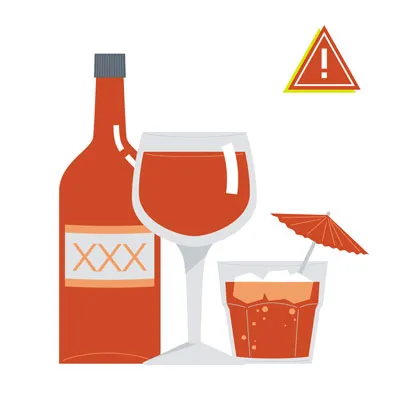 Puppy looking at a glass of alcohol
Puppy looking at a glass of alcohol
2. Apple, Apricot, Cherry, and Plum Seeds/Pits
While the flesh of apples can be a safe treat (cored and deseeded), the seeds contain cyanide. Similarly, the pits of apricots, cherries, peaches, and plums also contain cyanide. Ingestion, especially in a curious puppy, can lead to serious problems such as vomiting, irregular heartbeat, seizures, and even death, as cyanide interferes with the blood’s ability to carry oxygen. Always remove all seeds and pits before offering any fruit flesh.
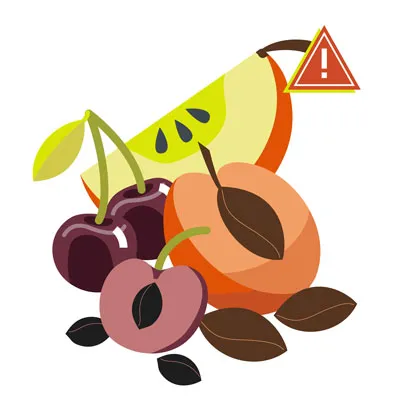 Variety of fruit seeds and pits
Variety of fruit seeds and pits
3. Avocado
Avocados contain a fungicidal toxin called persin, which can cause vomiting and diarrhea in some animals, including puppies. Furthermore, an intact avocado pit poses a significant choking hazard and can cause a dangerous gastrointestinal obstruction, requiring emergency surgery. It’s best to keep avocados completely off your puppy’s menu.
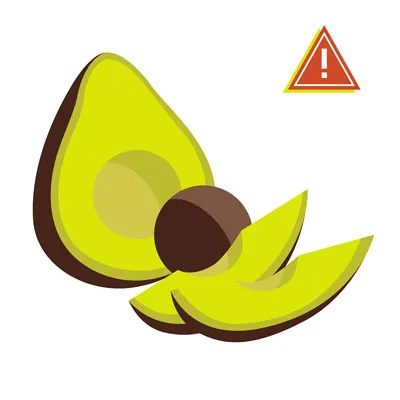 Avocado sliced open
Avocado sliced open
4. Broccoli
Broccoli contains isothiocyanates, which can cause mild to severe gastrointestinal irritation in puppies, especially in larger quantities. While small amounts might occasionally be tolerated by adult dogs, it’s generally best to avoid feeding broccoli to puppies to prevent stomach upset. Also, raw broccoli stalks can be a choking hazard.
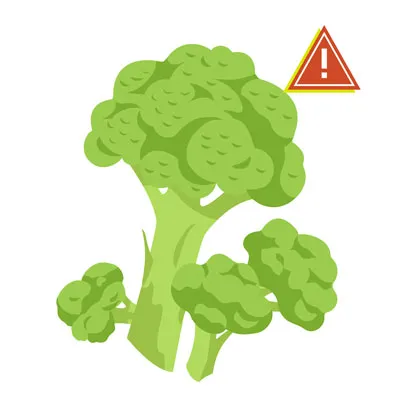 Raw broccoli florets
Raw broccoli florets
5. Caffeine and Coffee Grounds
Caffeine, found in coffee, tea, chocolate, and energy drinks, contains methylxanthines. These stimulants can be particularly dangerous for puppies, leading to symptoms like hyperactivity, vomiting, diarrhea, tremors, seizures, and a dangerously irregular heartbeat. Even a small amount of coffee grounds or a caffeinated beverage can be fatal.
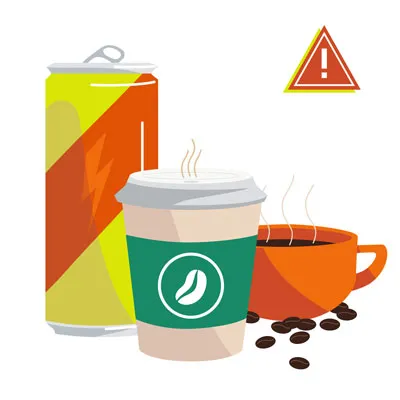 Coffee beans and grounds
Coffee beans and grounds
6. Chicken & Turkey Skin, Ham, and Other Fatty Cuts of Meat
High-fat foods like chicken or turkey skin, ham, and other fatty meat trimmings are especially problematic for puppies. Their developing pancreases are highly susceptible to acute pancreatitis, a life-threatening inflammation of the pancreas that can cause severe pain, vomiting, diarrhea, and require intensive veterinary care. When considering what meat should you never give a dog, fatty cuts are at the top of the list. Also, never give cooked bones, as they can splinter and cause internal damage or blockages.
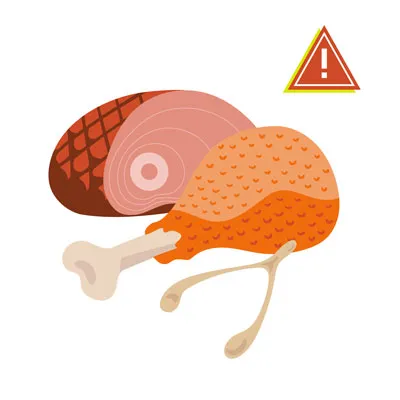 Various fatty cuts of meat
Various fatty cuts of meat
7. Chocolate
Chocolate is highly toxic to puppies due to the presence of theobromine and caffeine. Puppies cannot metabolize these substances as efficiently as humans, leading to a rapid buildup that can be lethal. Dark chocolate and baking chocolate are the most dangerous, but any type of chocolate should be strictly avoided. Symptoms include hyperactivity, vomiting, diarrhea, increased thirst, panting, tremors, seizures, and abnormal heart rhythm. If your puppy ingests any amount of chocolate, seek immediate veterinary attention.
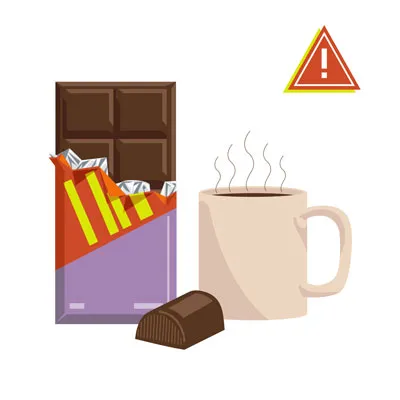 Assorted chocolates
Assorted chocolates
8. Grapes and Raisins
Even small amounts of grapes and raisins can cause sudden kidney failure in puppies. The exact toxic substance is tartaric acid, which can severely damage a puppy’s developing kidneys. Symptoms may include vomiting, diarrhea, lethargy, loss of appetite, abdominal pain, and decreased or absent urine production. These fruits are unequivocally on the list of what foods not to give puppies.
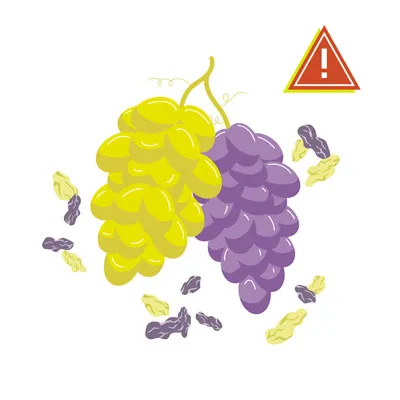 Bunches of grapes and a bowl of raisins
Bunches of grapes and a bowl of raisins
9. Macadamia Nuts, Almonds, and Pistachios
Macadamia nuts are highly toxic to dogs, including puppies, causing weakness, vomiting, tremors, and hyperthermia. Even a small handful can cause severe poisoning in a young, small puppy. Other nuts like almonds and pistachios are also best avoided due to their high fat content, which can cause pancreatitis, and their hard texture, which presents a significant choking hazard, especially for puppies learning to chew.
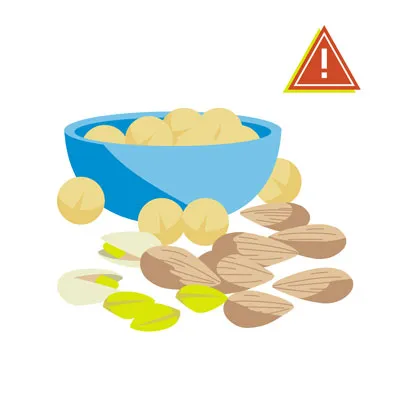 Macadamia nuts, almonds, and pistachios
Macadamia nuts, almonds, and pistachios
10. Milk and Dairy Products
Many puppies, like adult dogs, are lactose intolerant and lack the enzyme (lactase) needed to break down lactose in milk. Feeding them milk or other dairy products can lead to significant gastrointestinal upset, including diarrhea, gas, and vomiting. While some puppies might tolerate small amounts of plain, low-fat cheese, it’s generally safer to avoid dairy entirely to prevent discomfort. High-sugar, high-fat dairy products like ice cream are particularly bad for puppies.
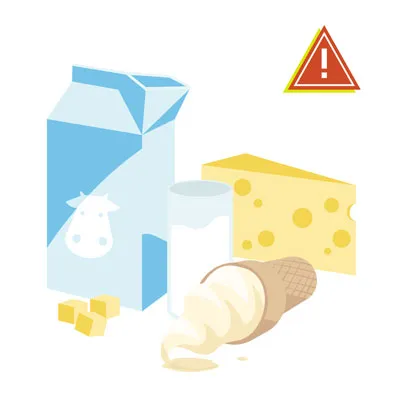 Glass of milk and various dairy products
Glass of milk and various dairy products
11. Mushrooms
While store-bought white mushrooms may be considered safe by some, it’s best to avoid feeding any mushrooms to your puppy. Wild mushrooms are particularly dangerous, as many are highly toxic and can cause kidney and liver failure, vomiting, diarrhea, hallucinations, or damage to red blood cells. Given the severe risks, opting for other safe treats is always the wiser choice.
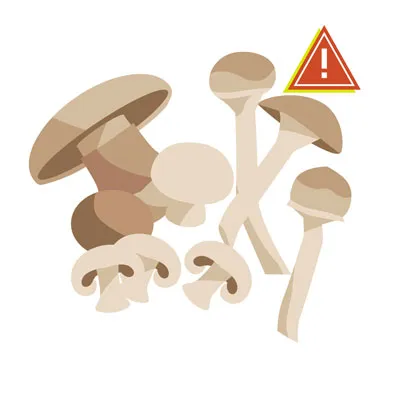 Assorted wild mushrooms
Assorted wild mushrooms
12. Nutmeg and Cinnamon
Nutmeg contains myristicin, a compound that can cause hallucinations, disorientation, increased heart rate, high blood pressure, and severe vomiting in puppies. The effects are more pronounced in smaller animals and with higher doses. Cinnamon, while not strictly toxic, can cause irritation to a puppy’s mouth and digestive tract, and in large amounts, it can lead to low blood sugar, which is dangerous for young pups.
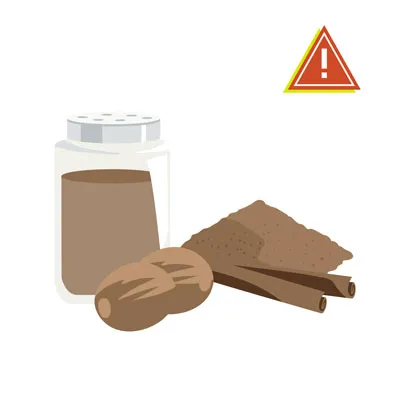 Nutmeg and cinnamon sticks
Nutmeg and cinnamon sticks
13. Onions, Garlic, Chives, and Leeks
All members of the allium family—onions, garlic, chives, and leeks—are highly toxic to puppies. They contain sulfoxides and disulfides, which damage red blood cells and lead to a potentially fatal condition called hemolytic anemia. Garlic is generally considered more potent than onions. These ingredients are often hidden in prepared foods, so always check labels. Japanese breeds like Akitas and Shiba Inus are particularly sensitive.
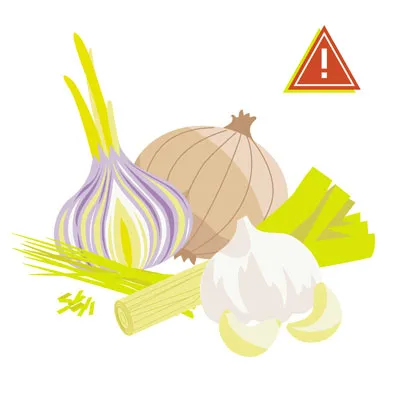 Onions, garlic, chives, and leeks
Onions, garlic, chives, and leeks
14. Salt
Excessive salt intake can lead to sodium ion poisoning in puppies. This can cause vomiting, diarrhea, lethargy, tremors, seizures, and even coma or death. Foods high in salt, like potato chips, pretzels, or even homemade play dough, should be kept away from curious puppies. Always provide access to fresh, clean water to help regulate their fluid balance.
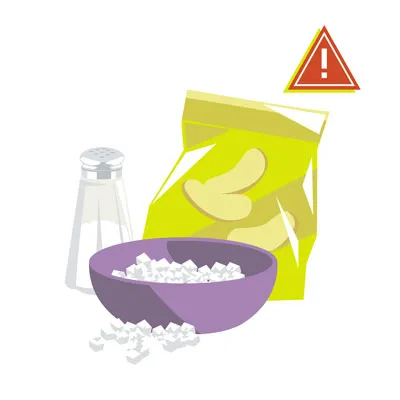 Pile of salt granules
Pile of salt granules
15. Spicy Food
Spicy foods can cause significant gastrointestinal distress in puppies, leading to painful vomiting, diarrhea, and stomach ulcers. Puppies have sensitive digestive systems, and ingesting anything spicy can lead to an emergency veterinary visit. It’s best to avoid all seasoned or spicy human foods.
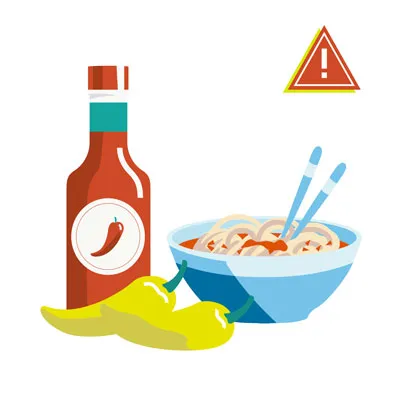 Spicy chili peppers
Spicy chili peppers
16. Sugar-Free Gum and Candy (Xylitol)
Xylitol is an artificial sweetener found in many sugar-free products, including gum, candy, mints, and certain baked goods, as well as some peanut butter brands. It is extremely toxic to puppies. Even a small amount can cause a rapid and severe drop in blood sugar (hypoglycemia), leading to weakness, loss of coordination, seizures, and potentially liver failure. This is one of the most critical items on the list of what foods not to give puppies. Always check labels carefully.
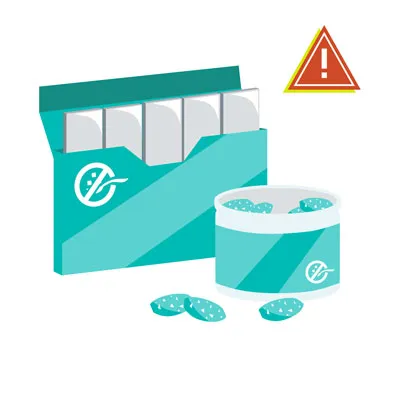 Sugar-free gum and candy
Sugar-free gum and candy
17. Tomatoes and Raw Potatoes
Unripe green tomatoes and the green parts of the tomato plant contain solanine, a toxic compound that can cause gastrointestinal upset, lethargy, weakness, and confusion in puppies. Ripe red tomatoes are generally safe in moderation. Similarly, raw potatoes also contain solanine and should be avoided. Cooked, plain potatoes (without any seasonings or additives) are generally safe in small amounts for adult dogs, but caution is still advised for puppies.
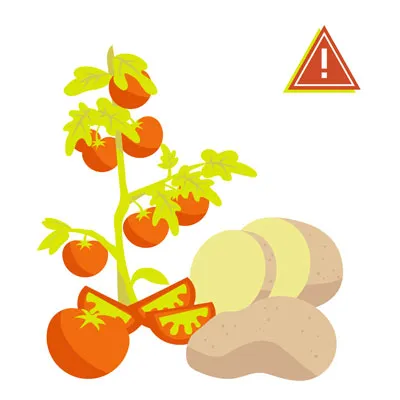 Unripe tomatoes and raw potatoes
Unripe tomatoes and raw potatoes
18. Tobacco
Tobacco products, including cigarettes, cigars, chewing tobacco, and nicotine vaping liquids, are highly dangerous for puppies. Nicotine exposure can cause a range of severe symptoms such as vomiting, diarrhea, agitation, tremors, seizures, abnormal heart rate, and even coma or death. Puppies are particularly curious and may try to chew on discarded cigarette butts. If your puppy ingests any tobacco, immediate veterinary care is essential.
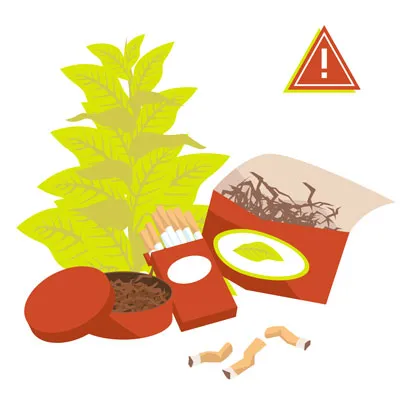 Tobacco leaves and products
Tobacco leaves and products
19. Yeast and Raw Dough
Raw yeast dough is extremely hazardous for puppies. The raw dough can expand in their warm stomach, causing severe bloating, pain, and potentially life-threatening gastric dilatation-volvulus (GDV), or stomach torsion/rupture. Additionally, the yeast ferments the sugars in the dough, producing alcohol, which can lead to alcohol poisoning. This dual threat requires immediate medical intervention if a puppy ingests raw dough.
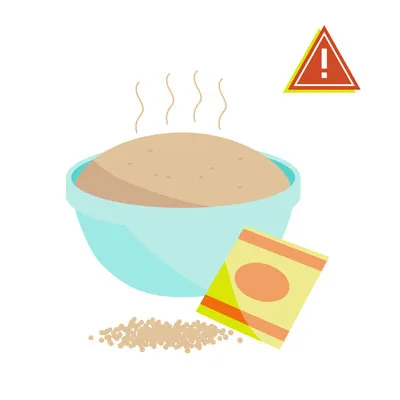 Raw dough and yeast packets
Raw dough and yeast packets
20. Raw Meat
Never feed your puppy raw or undercooked meat. While some advocates promote raw feeding for adult dogs, a puppy’s undeveloped immune system is much more susceptible to harmful bacteria like Salmonella and E. coli often found in raw meat, leading to severe gastrointestinal illness. Furthermore, bones in raw meat can pose a choking hazard or cause internal injuries.
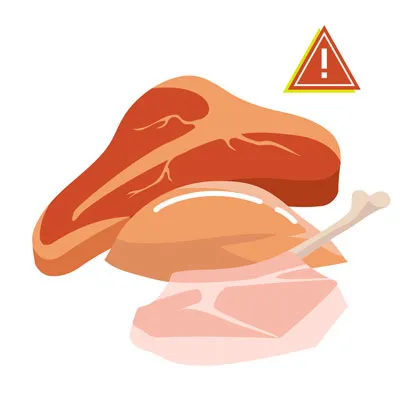 Raw meat cuts
Raw meat cuts
21. Rhubarb
Rhubarb is not safe for puppies due to the presence of soluble calcium oxalate crystals, especially in its leaves. Ingested in large enough quantities, these crystals bind with calcium in the body, causing a dangerous drop in calcium levels (hypocalcemia) and potentially leading to acute kidney failure. Symptoms include tremors, weakness, excessive drooling, bloody urine, and changes in thirst or urination.
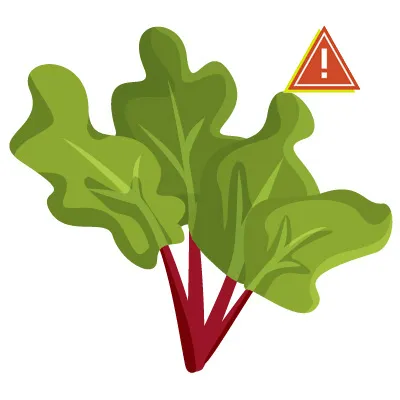 Rhubarb stalks
Rhubarb stalks
22. Star Fruit
Similar to rhubarb, star fruit also contains soluble calcium oxalate crystals, making it unsafe for puppies. Consumption can lead to the same dangerous effects, including kidney problems and calcium imbalances. It’s best to keep this exotic fruit away from your curious pup.
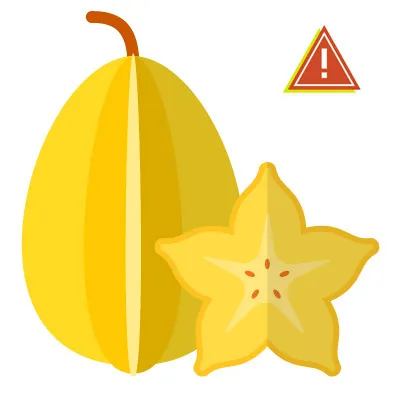 Sliced star fruit
Sliced star fruit
23. Flavored Water and Seltzer Water
Stick to plain, fresh water for your puppy. Flavored waters often contain added sugars, artificial sweeteners (like xylitol), or other ingredients that can be harmful. While plain seltzer water might seem innocuous, the carbonation can cause gas and bloating, which can be particularly uncomfortable or even dangerous for a puppy, especially for breeds prone to bloat.
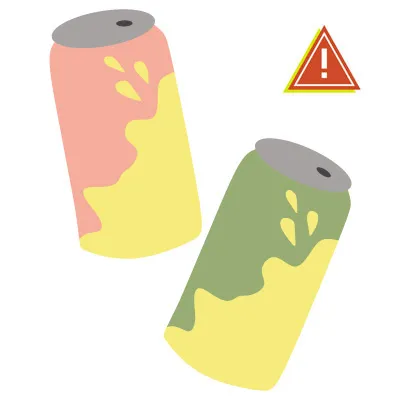 Seltzer water bottle
Seltzer water bottle
Understanding Puppy Poisoning: Symptoms and What to Do
Recognizing the signs of food toxicity quickly is crucial for your puppy’s prognosis. Symptoms can vary widely depending on the type and amount of food ingested, but common indicators include:
- Gastrointestinal Issues: Vomiting, diarrhea (which may be bloody), loss of appetite, abdominal pain, excessive drooling.
- Neurological Signs: Lethargy, weakness, disorientation, tremors, seizures, hyperactivity, uncoordinated movements.
- Cardiovascular Problems: Increased heart rate, abnormal heart rhythm, changes in breathing.
- Other Symptoms: Increased thirst, changes in urination, pale gums, excessive panting, abdominal bloating that feels hard to the touch.
If you suspect your puppy has eaten something toxic, act immediately:
- Contact your veterinarian or an emergency animal hospital: Do this without delay. Have their number readily available. Time is of the essence in most poisoning cases.
- Gather crucial information: Be prepared to tell the vet:
- What food was eaten.
- Approximately how much was consumed.
- When the ingestion occurred.
- Any symptoms your puppy is currently showing.
- Your puppy’s breed and approximate weight.
- Do NOT induce vomiting unless instructed by a vet: Inducing vomiting can sometimes be more harmful depending on the substance ingested (e.g., caustic substances can cause more damage coming back up). Your vet will advise the safest course of action.
- Avoid home remedies: Do not give your puppy any home remedies or medications without direct veterinary guidance. What helps one type of poisoning could worsen another.
Early intervention significantly increases the chances of a full recovery.
Preventing Accidental Puppy Poisoning
While accidents can happen, proactive measures are key to minimizing the risk of your beloved puppy getting into unsafe human food.
1. Store Foods Out of Reach
The simplest and most effective prevention is to keep all potentially toxic foods securely stored where your puppy cannot access them. Use high shelves, locked cabinets, or pet-proof containers. Remember how resourceful and agile puppies can be – if they can reach it, they will likely investigate it.
2. Avoid Feeding Puppies from Your Plate
Resist the urge to share your food, no matter how much your puppy begs. This establishes a clear boundary and reduces the chance of them accidentally ingesting something harmful. It’s safest to only give your puppy treats made specifically for puppies. Always be mindful of what foods can you give dogs safely before sharing any human food.
3. Educate Family Members and Guests
Ensure everyone in your household, including children and visitors, understands the dangers of feeding human food to your puppy. Clearly communicate that no table scraps or “sneaky treats” should be given without your express permission, and ideally, only approved puppy treats.
4. Be Careful During Holidays and Gatherings
Holidays often involve an abundance of rich, human foods and a busy environment where vigilance might slip. This is a prime time for accidental ingestions. Be extra cautious during these periods, keeping food secured and ensuring your puppy is supervised or safely confined away from the feasting area.
Safe & Healthy Treats: What Puppies Can Eat
While our focus has been on what foods not to give puppies, it’s also helpful to know that there are many safe and healthy human foods that, in moderation, can be wonderful treats for your growing pup. These include:
- Apples (cored and deseeded): A great source of vitamins and fiber.
- Carrots: Excellent for dental health and packed with vitamins.
- Blueberries: Full of antioxidants and fiber.
- Green Beans: Low in calories and rich in vitamins.
- Plain, Cooked Chicken or Turkey (no skin, bones, or seasoning): A lean protein source.
- Peanut Butter (xylitol-free, unsalted): A favorite treat and a good source of protein and healthy fats. Always check the label for xylitol.
These options can be a healthy addition to a balanced puppy diet, but always introduce new foods slowly and in small amounts to monitor for any adverse reactions. For a more extensive list of approved human foods, you can refer to articles on what are some things dogs can eat.
Conclusion: Keeping Your Puppy Safe and Healthy
Navigating your puppy’s diet can feel like a minefield, but with the right knowledge and vigilance, you can ensure their safety and well-being. Understanding what foods not to give puppies is a fundamental aspect of responsible pet parenthood. From common kitchen staples like chocolate and grapes to unexpected hazards like xylitol and raw dough, being aware of these dangers empowers you to protect your young companion.
Always prioritize your puppy’s commercial, age-appropriate dog food as their primary diet, and consider any human foods as occasional, small treats—only after confirming their safety with your veterinarian. Should the unfortunate happen and your puppy ingests something toxic, remember to act swiftly by contacting your vet or poison control.
At Dog Care Story, we believe in empowering pet parents with accurate and reliable information. By staying informed and taking preventive measures, you are building a strong foundation for a long, healthy, and happy life for your puppy. Explore our other articles for more tips on puppy care and nutrition, and consider pet insurance to help cover unexpected incidents that may arise.
Sources/Citations
- “Top 10 dog poisons,” Hilary Parker (5/2023), WebMD, https://www.webmd.com/pets/dogs/top-10-dog-poisons
- “What happens if a dog eats chocolate?” (10/2023), Colorado State University, https://vetmedbiosci.colostate.edu/vth/animal-health/why-is-chocolate-bad-for-dogs/
- “Fruits and vegetables dogs can or can’t eat,” (3/2024), American Kennel Club, https://www.akc.org/expert-advice/nutrition/fruits-vegetables-dogs-can-and-cant-eat/
- “What to do if your dog drinks alcohol,” Jerry Klein (7/2023), American Kennel Club, https://www.akc.org/expert-advice/vets-corner/is-alcohol-dangerous-for-dogs/
- “Can dogs eat apples?” Hector Joy (12/2022), PetMD, https://www.petmd.com/dog/general-health/can-dogs-eat-apples
- “Can dogs eat plums?” Katie Koschalk (7/2023), Chewy, https://be.chewy.com/nutrition-pet-diet-tips-can-dogs-eat-plums/
- “Avocado (Persea spp) Toxicosis in Animals,” Cristine Hayes (9/2024), Merck Veterinary Manual, https://www.merckvetmanual.com/toxicology/food-hazards/avocado-persea-spp-toxicosis-in-animals
- “People foods to avoid feeding your pets,” (n.d.), ASPCA, https://www.aspca.org/pet-care/animal-poison-control/people-foods-avoid-feeding-your-pets
- “People foods dogs can and can’t eat,” (3/2024), American Kennel Club, https://www.akc.org/expert-advice/nutrition/human-foods-dogs-can-and-cant-eat/
- “Can dogs eat nuts?” Amanda Ardente (1/2023), PetMD, https://www.petmd.com/dog/nutrition/can-dogs-eat-nuts
- “Can dogs drink milk?” Sandra C. Mitchell (1/2024), PetMD, https://www.petmd.com/dog/nutrition/can-dogs-drink-milk
- “Can dogs have nutmeg?” Barri J. Morrison (11/2023), PetMD, https://www.petmd.com/nutmeg-safe-dogs
- “Onion, garlic, chive, and leek poisoning in dogs,” Renee Schmid et al. (2024), VCA Animal Hospitals, https://vcahospitals.com/know-your-pet/onion-garlic-chive-and-leek-toxicity-in-dogs
- “Can dogs eat tomatoes?” Anna Burke (10/2024), American Kennel Club, https://www.akc.org/expert-advice/nutrition/can-dogs-eat-tomatoes/
- “Can dogs eat potatoes?” Katherine Ripley (11/2023), American Kennel Club, https://www.akc.org/expert-advice/nutrition/can-dogs-eat-potatoes/
- “What to do if your dog eats a cigarette butt,” (6/2023), American Kennel Club, https://www.akc.org/expert-advice/health/dog-ate-cigarette-butt/
- “Dough & dogs: Why it’s bad and what you can do,” Lisa Goldstein (7/2024), Preventive Vet, https://www.preventivevet.com/dogs/dough-is-toxic-to-dogs
- “Rhubarb,” (n.d.), Pet Poison Helpline, https://www.petpoisonhelpline.com/poison/rhubarb/
- “Can dogs drink carbonated water?” Heather Logue (n.d.), Rover, https://www.rover.com/blog/can-dogs-drink-carbonated-water/
- “What fruits can dogs eat?” Ellen Malmanger (2/2024), PetMD, https://www.petmd.com/dog/nutrition/what-fruits-can-dogs-eat
- “Can dogs have green beans?” Anna Burke (8/2022), American Kennel Club, https://www.akc.org/expert-advice/nutrition/can-dogs-have-green-beans/
- “About pet food safety,” (4/2024), CDC, https://www.cdc.gov/healthy-pets/about/pet-food-safety.html
